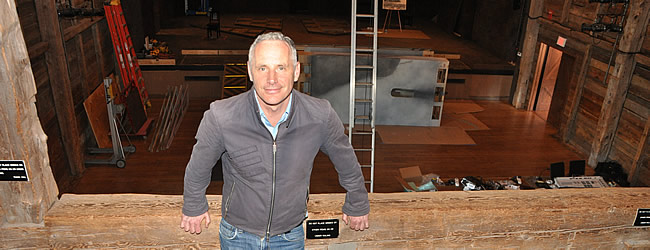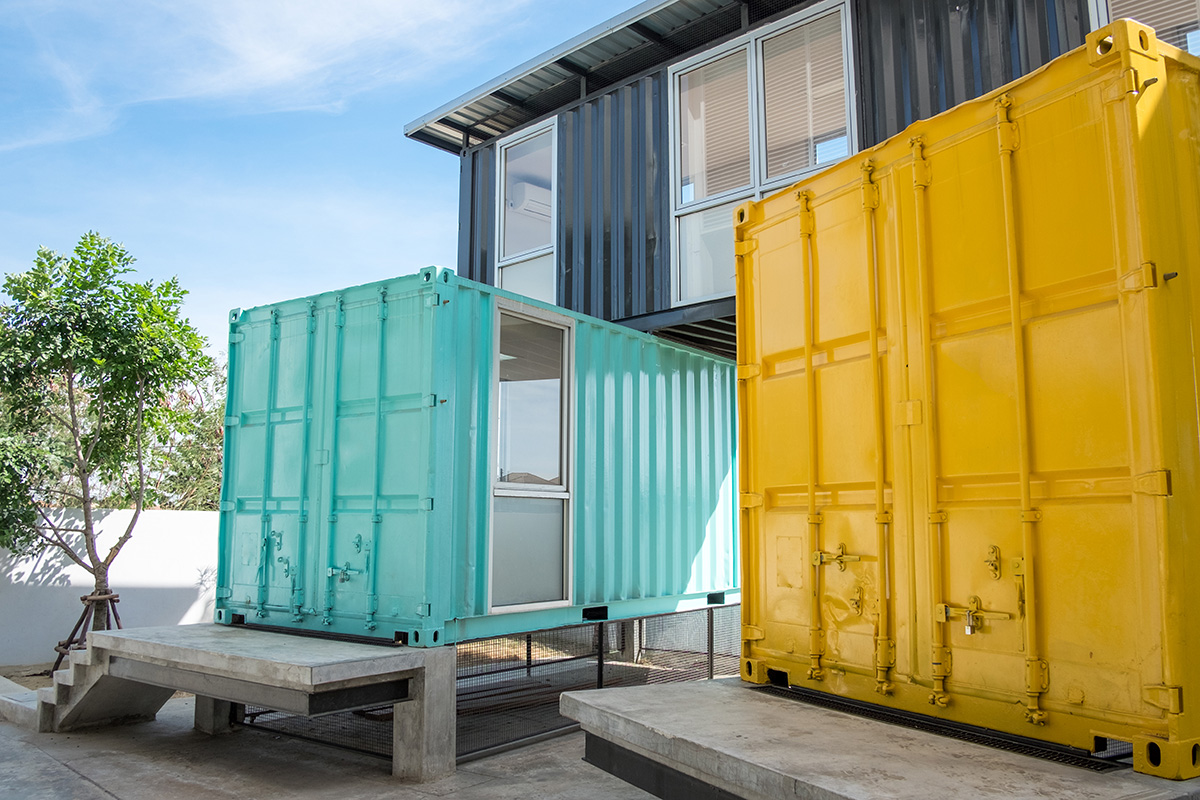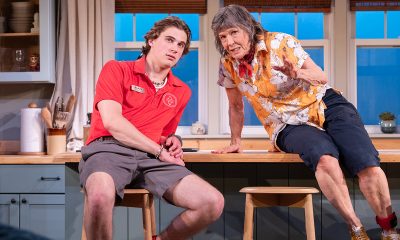Living
Laughs in the libretto
New Wolf Trap-commissioned opera ‘The Inspector’ debuts next week

‘The Inspector’
A world-premiere opera based on Gogol’s play ‘The Inspector General.’ Music by John Musto, book and libretto by Mark Campbell. April 29 at 8 p.m. and May 1at 3 p.m.
Free one-hour talk at the Center for Education, next door to The Barns, an hour prior to each two-hour show.
The Barns at Wolf Trap
1645 Trap Rd., Vienna, VA
Tickets: $32-$72
877-965-3872/wolftrap.org
Comedy is a different animal when it comes to opera.
That’s the experience of Mark Campbell, author of a new comic opera, “The Inspector,” that features his laugh-out-loud, incisive libretto matched perfectly to the expressive melodies in composer John Musto’s sophisticated-yet-fun style. It comes to the stage in its world premiere at The Barns at Wolf Trap on three nights beginning Wednesday.
Based on all advance indications, it will be another triumph for the veteran collaborators, Campbell and Musto, whose comic operas “Volpone” won major plaudits at Wolf Trap in 2004 and returned there for a successful reprise in 2007.
“We were their matchmakers,” Kim Witman, Wolf Trap Opera’s director, rightly boasts, about bringing the two together for “Volpone,” and she admits that “anytime you do that, you just don’t know at the beginning what’s going to work or not.”
This combo worked so well, says Witman, “that we’ll take the credit” for making it happen. About “The Inspector,” she says, “They both have an approach to this work that is modern in feeling, not as in avant-garde” — which in opera can be cold and remote — “but that hits the sweet spot.”
“The Inspector,” an update of the 1836 classic tongue-in-cheek satirical play by Russian writer Nikolai Gogol, “intersects as music and words,” she says, “with its own spin on our contemporary world, because this is not about high art, but they each set out to entertain.”
What’s great about the two, she adds, is that “they use actual English words and the same syntax you would use if you spoke to someone on the street, so it doesn’t feel theatrical, it just sounds familiar,” in Campbell’s way with words and Musto’s melodic punctuation.
Witman, an old hand at making opera come alive for new audiences, admits that “We’re hampered by the fact that we are called opera,” but she stresses, “in many ways ‘The Inspector’ is really musical theater. It’s simply that it’s sung by people with operatically trained and expressive voices, without microphones.” She points out that on Broadway, singers’ voices are amplified, but not in opera. “That’s what makes it opera,” but with “The Inspector,” she says, “in everything else it could just as easily be musical theater.”
Opera is alienating to some, she says.
“Many people won’t come out to anything called opera, because they think they’ll feel stupid or that it’s stupid because they can’t understand it. It’s because of the trappings of opera, the exaggerated posturing, that people stay away, and because it’s in another language, so people think ‘I won’t understand it,’ and because they think it’s going to be five hours long.”
But “The Inspector” is sung in English, with constant wisecracks, and she says, “is very fast,” clocking in at just two hours long.
Campbell — who is gay, and openly declares, “I’m single and available for marriage, unfortunately not yet in New York (he lives in New York City), but in D.C.” — says that he and Musto “were told to write a comedy because they (Wolf Trap) loved ‘Volpone,'” which was based on the English play of that name (in Italian it means “sly fox”) written by Ben Jonson and first produced in 1606.
Musto is Italian — half Sicilian and half Neapolitan — so Campbell says that when they put their heads together they soon decided to revamp and relocate the classic Gogol comedy, set in Tsarist Russia, to Mussolini-era Italy, and instead of Russian-flavored music, Campbell says it is very Italian in flavor, with tarantellas, those Italian folk dances with fast upbeat tempos, not cossack-style dances.
“The composer must help make the opera funny,” and all of Musto’s music, says Campbell, is created to make sure that the comedy of the libretto — the words — lands with flair and funny impact.
This is their fourth opera together. Three are comedies, and the fourth, says Campbell, has comic elements — “Later The Same Evening,” based on the paintings of American artist Edward Hopper.
“When it comes to comedy, we know how to do this,” he says.
That doesn’t mean it’s easy.
“It’s harder to do than drama, because it must do the same thing that drama does, create clear characters who want something, the same thing as when you tell any story, but it must also be funny.”
Campbell says that “you’d have to ask my friends if I’m funny” but that he thinks that he’s “actually a pretty miserable person, as are most people who have a comic bent, because at the core of their heart is something that’s pretty dark.”
Soprano Anne-Carolyn Bird, who sings the role of the mayor’s daughter, Beatrice, in “The Inspector,” agrees. She has worked with Campbell before, in the 2007 revival of “Volpone,” when she also sang on the cast recording of it which was nominated for a Grammy.
“He’s very friendly,” she says, “but at the same time he’s very private, and a lot of artists are like that.”
“We know how to bond with people, but we save ourselves for a few people and put the rest into our art,” so she says that “you get to know more about Mark by reading his work than by spending time with him in a casual setting.”
And “The Inspector” is funny, albeit set in a dark time, in late 1920s Sicily, when the new Italian dictator, Benito Mussolini, the fascist leader, or “Il Duce,” decided to try to clean up the inbred corruption on the island with its Mafia-style gangs that ruled in politics and society with a heavy hand of thuggery and thievery.
“His ego had been hurt,” says Campbell, who spent a long time researching the history of the period, “so he sent in his own inspectors — called “prefetti,” or prefects — to clean up the corruption in local power centers on the island. So the scene is set for the village (imaginary but based on his research) of Santa Schifezza, whose local mayor’s rule is both criminal and unchallenged, until someone the mayor (Fazzobaldi) believes to be Mussolini’s inspector arrives.
Tancredi, this mysterious stranger, traveling with his manservant Cosimo — exceedingly smart, acerbic even, and definitely more pragmatic than his “master” — arrive just as the citizens of Santa Schifezza have gathered to rehearse the town’s new anthem — which is so bad it’s utterly funny — for the next day, Municipal Mayor Day, a day Mayor Fazzobaldi has instituted in honor of himself.
But the mayor has been informed that an inspector from Rome will soon arrive, incognito, and put at risk the entire way of life, based on corruption, he has worked so hard to keep going. When the goofy twins, Bobachina and Bobachino, who run the post office, stumble in with the news that they have spotted a new arrival at the inn, and that he is tall, eloquent, elegant — and blond — the mayor immediately jumps to the conclusion that he must be the anticipated inspector.
“Comedy as a form of theater is different from humor,” says Campbell, born in D.C. and a Maryland resident until age 12. “In opera it’s usually found,” he says, “when characters are so obsessed with something — with greed or in the case also with abuse of power — that audiences don’t find it sad but funny.”
But he says his own favorite moments in comic operas are the sad or tragic moments, such as in the character of Figaro from the Beaumarchais play which formed the basis for Mozart’s opera “The Marriage of Figaro” and Rossini’s opera “The Barber of Seville.”
“I have done my job,” Campbell says, “if I have first seduced people with the jokes and then pull a 180-degree turn and stop them dead in their tracks, surprising them with an incredibly sad moment. Opera allows you to do that, and in many other art forms you just can’t do this so efficiently, because it has music which allows you to cut to the chase faster than with mere language.”
Campbell, who wrote the funny lyrics to the musical “And The Curtain Rises,” which just closed its world-premiere run at the Signature Theatre in Arlington, has also just come from Norfolk, Va., where the Virginia Opera premiered this month his musical theater piece based on a Civil War theme, “Rappahanock County,” in collaboration with the composer Ricky Ian Gordon, who is also gay and whose own musical “Sycamores” premiered last year at Signature Theatre.
Campbell is philosophical about being single, having been, he says, “in several long-term relationships, which were fairly happy ones, but I am not someone who believes in love forever, because people change and can evolve into a relationship and then evolve out of it.”
Three of his former partners “are now among my best friends,” he says. “If you love someone, you want them to be happy, and if you’re truly invested with someone it’s just a matter of reformatting the relationship.” But he’s also realistic — because first “you must get past the awkwardness of the first couple of years and the first new boyfriends.”
Could a comic opera on the subject be far behind?

Dear Michael,
I keep getting rejected on the apps. I don’t want to put myself out there anymore.
I don’t understand gay men. I think they behave really badly.
Guys stop replying in the middle of a text conversation and then un-match me. Guys don’t show up when we make a plan to meet. After a date or even a hookup that it seems clear we both enjoyed, I never hear from the guy again.
I am a pretty good looking and successful guy. I’m not a model or a billionaire but I’m sincerely wanting to date and eventually share a life with someone.
Unfortunately, everyone I am meeting, even if they say they have similar aspirations for a partner, acts like they’re looking over my shoulder for something better, and drops me for I-don’t-know-what reason.
I don’t have a lot of trust in the sincerity of gay men.
I know I sound bitter but I’ve been at this for a while and it keeps happening.
I know there’s a saying that if it keeps happening to you, you must be the problem. Logically that makes sense.
Except, I think this keeps happening so often and so predictably that it’s not me. These people hardly know me. It’s more along the lines of, if everything about me isn’t exactly what they want, or some little thing that I say, think, or do offends them, they vanish.
I’m lonely, but what’s out there is awful. Maybe it’s best to not keep trying.
If you have a different way of seeing it that’s honest, not just some fluff to make me feel better and be hopeful, please enlighten me.
Michael replies:
I agree with you, there is a lot of this kind of behavior out there. I hear stories similar to yours all the time. Though people do find great relationships online, relying on apps to meet a partner can be tricky.
Hookup apps have little to do with any kind of real connection. Often, they don’t even have much to do with sex. For a lot of people, they’re more about trying to fill up some kind of emptiness and seeking validation. They also, obviously, objectify men, which is the opposite experience of what you’re seeking.
And dating apps lend themselves to a sort of takeout menu concept of dating. You get to specify exactly what you’re looking for—a little of this, a lot of that, please omit something else—and then believe you should get what you ordered. As if that really exists. And when something isn’t just what you wanted, forget it.
But life doesn’t work that way. Nor do people: You can enter the exact criteria for the man of your dreams, but he will surprise you or let you down at times in some major ways. That’s how it goes. Part of being in a relationship is accepting that we all have to deal with imperfection.
All that said, hordes of people are going to keep using all sorts of apps and keep looking for “perfect” partners and keep ditching perfectly fine guys for the most minuscule of reasons.
But that doesn’t mean that you have to stay on the apps if it’s demoralizing you and leaving you hopeless.
Before you sign off, perhaps you would like to have some fun and be creative. Just for example, you could write in your profile that you’re interested in meeting a guy who isn’t looking for perfection and is looking for a decent soul rather than a set of stats. You still might encounter a lot of guys who ghost you for no apparent reason, but you also might have some luck finding a sincere someone with relationship goals that are similar to yours.
Another, complimentary strategy: Toughen up your attitude to stop letting let these rejections get under your skin. They have little to do with who you are (unless you are oblivious to some major issue about yourself), so you needn’t take them personally. In other words, expect this to keep happening; and when it does, laugh and keep moving forward.
I understand you are feeling like giving up on gay men in general. Keep in mind that while there are a lot of reasons why many gay men focus more on sex and less on commitment, that isn’t true across the board. In my work over the years, I have met many gay men who are looking for what you’re seeking. You could strive to be hopeful that if you keep looking, you are likely to cross paths with some of them.
And where you look may play a role.
Whether or not you stay on the apps, I suggest you seek additional ways to meet a potential boyfriend. Before apps existed, people did find other ways to meet romantic partners, and these ways do still exist. I know that this path is not an easy one. The whole dating endeavor isn’t easy. But difficult is not impossible.
There are social and activity groups for gay men that are organized around some sort of shared interest. They aren’t overtly sexual, so often attract people who are interested in and looking for a deeper connection. Even if you don’t meet a boyfriend there, you might make some like-minded friends, and one thing may lead to another in all sorts of ways.
There’s also plenty you can do as a human being (not simply as a gay man) in the offline world that might interest and even uplift you, where you just might meet a man you like. Again, you might also simply make some friends, and through having a bigger social life, might ultimately meet your guy.
Simply put: Don’t let yourself feel like or be a victim. Don’t keep putting yourself in miserable situations. And figure out what it means for you to do your best to make what you’d like to happen, happen.
Michael Radkowsky, Psy.D. is a licensed psychologist who works with couples and individuals in D.C., Maryland, Virginia, and New York. He can be found at michaelradkowsky.com. All identifying information has been changed for reasons of confidentiality. Have a question? Send it to [email protected].
Real Estate
New year, new housing landscape for D.C. landlords
Several developments expected to influence how rental housing operates

As 2026 begins, Washington, D.C.’s rental housing landscape continues to evolve in ways that matter to small landlords, tenants, and the communities they serve. At the center of many of these conversations is the Small Multifamily & Rental Owners Association (SMOA), a D.C.–based organization that advocates for small property owners and the preservation of the city’s naturally occurring affordable housing.
At their December “DC Housing Policy Summit,” city officials, housing researchers, lenders, attorneys, and housing providers gathered to discuss the policies and proposals shaping the future of rental housing in the District. The topics ranged from recent legislative changes to emerging ballot initiatives and understanding how today’s policy decisions will affect housing stability tomorrow.
Why Housing Policy Matters in 2026
If you are a landlord or a tenant, several developments now underway in D.C., are expected to influence how rental housing operates in the years ahead.
One of the most significant developments is the Rebalancing Expectations for Neighbors, Tenants and Landlords (RENTAL) Act of 2025, a sweeping piece of legislation passed last fall and effective December 31, 2025, which updates a range of housing laws. This broad housing reform law will modernize housing regulations and address long-standing court backlogs, and in a practical manner, assist landlords with shortened notice and filing requirements for lawsuits. The Act introduces changes to eviction procedures, adjusts pre-filing notice timelines, and modifies certain tenant protections under previous legislation, the Tenant Opportunity to Purchase Act.
At the same time, the District has expanded its Rent Registry, to have a better overview of licensed rental units in the city with updated technology that tracks rental units subject to and exempt from rent control and other related housing information. Designed to improve transparency and enforcement, Rent Registry makes it easier for all parties to verify rent control status and compliance.
Looking ahead to the 2026 election cycle, a proposed ballot initiative for a two-year rent freeze is generating significant conversation. If it qualifies for the ballot and is approved by voters, the measure would pause rent increases across the District for two years. While still in the proposal phase, it reflects the broader focus on tenant affordability that continues to shape housing policy debates.
What This Means for Rental Owners
Taken together, these changes underscore how closely policy and day-to-day operations are connected for small landlords. Staying informed about notice requirements, registration obligations, and evolving regulations isn’t just a legal necessity. It’s a key part of maintaining stable, compliant rental properties.
With discussions underway about rent stabilization, voucher policies, and potential rent freezes, long-term revenue projections will be influenced by regulatory shifts just as much as market conditions alone. Financial and strategic planning becomes even more important to protect your interests.
Preparing for the Changes
As the owner of a property management company here in the District, I’ve spent much of the past year thinking about how these changes translate from legislation into real-world operations.
The first priority has been updating our eviction and compliance workflows to align with the RENTAL Act of 2025. That means revising how delinquent rent cases are handled, adjusting notice procedures, and helping owners understand how revised timelines and court processes may affect the cost, timing, and strategy behind enforcement decisions.
Just as important, we’re shifting toward earlier, more proactive communication around compliance and regulatory risk. Rather than reacting after policies take effect, we’re working to flag potential exposure in advance, so owners can make informed decisions before small issues become costly problems.
A Bigger Picture for 2026
Housing policy in Washington, D.C., has always reflected the city’s values from protecting tenants to preserving affordability in rapidly changing neighborhoods. As those policies continue to evolve, the challenge will be finding the right balance between stability for renters and sustainability for the small property owners who provide much of the city’s housing.
The conversations happening now at policy summits, in Council chambers, and across neighborhood communities will shape how rental housing is regulated. For landlords, tenants, and legislators alike, 2026 represents an opportunity to engage thoughtfully, to ask hard questions, and to create a future where compliance, fairness, and long-term stability go hand-in-hand.
Real Estate
Unconventional homes becoming more popular
HGTV show shines spotlight on alternatives to cookie cutter

While stuck in the house surrounded by snow and ice, I developed a new guilty pleasure: watching “Ugliest House in America” on HGTV. For several hours a day, I looked at other people’s unfortunate houses. Some were victims of multiple additions, some took on the worst décor of the ‘70s, and one was even built in the shape of a boat.
In today’s world, the idea of what a house should look like has shifted dramatically. Gone are the days of cookie-cutter suburban homes with white picket fences. Instead, a new wave of architects, designers, and homeowners are pushing the boundaries of traditional housing to create unconventional and innovative spaces that challenge our perceptions of what a home can be.
One of the most popular forms of alternative housing is the tiny house. These pint-sized dwellings are typically fewer than 500 square feet and often are set on trailers to allow for mobility. Vans and buses can also be reconfigured as tiny homes for the vagabonds among us.
These small wonders offer an affordable and sustainable living option for those wishing to downsize and minimize their environmental footprint. With clever storage solutions, multipurpose furniture, and innovative design features, tiny homes have become a creative and functional housing solution for many, although my dogs draw the line at climbing Jacob’s Ladder-type steps.
Another unusual type of housing gaining popularity is the shipping container home. Made from repurposed shipping containers, these homes offer a cost-effective and environmentally friendly way to create modern and sleek living spaces. With their industrial aesthetic and modular design, shipping container homes are a versatile option for those contemplating building a unique and often multi-level home.
For those looking to connect with nature, treehouses are a whimsical and eccentric housing option. Nestled high up in the trees, these homes offer a sense of seclusion and tranquility that is hard to find in traditional housing. With their distinctive architecture and stunning views, treehouses can be a magical retreat for those seeking a closer connection to the natural world.
For a truly off-the-grid living experience, consider an Earthship home. These self-sustaining homes use recycled construction materials and rely on renewable energy sources like solar power and rainwater harvesting. With their passive solar design and natural ventilation systems, Earthship homes are a model of environmentally friendly living.
For those with a taste for the bizarre, consider a converted silo home. These cylindrical structures provide an atypical canvas for architects and designers to create modern and minimalist living spaces. With curved walls and soaring ceilings, silo homes offer a one-of-a-kind living experience that is sure to leave an impression.
Barn homes have gained popularity in recent years. These dwellings take the rustic charm of a traditional barn and transform it into a modern and stylish living space. With their open, flexible floor plans, lofty ceilings, and exposed wooden beams, barn homes offer a blend of traditional and contemporary design elements that create a warm and inviting atmosphere, while being tailored to the needs and preferences of the homeowner.
In addition to their unique character, barn homes also offer a sense of history and charm that is hard to find in traditional housing. Many of them have a rich and storied past, with some dating back decades or even centuries.
If you relish life on the high seas (or at a marina on the bay), consider a floating home. These aquatic abodes differ from houseboats in that they remain on the dock rather than traverse the waterways. While most popular on the West Coast (remember “Sleepless in Seattle”?), you sometimes see them in Florida, with a few rentals available in Baltimore’s Inner Harbor and infrequent sales at our own D.C. Wharf. Along with the sense of community found in marinas, floating homes offer a peaceful retreat from the hustle and bustle of city life.
From tiny homes on wheels to treehouses in the sky or homes that float, these distinctive dwellings offer a fresh perspective on how we live and modify traditional thoughts on what a house should be. Sadly, most of these homes rely on appropriate zoning for building and placement, which can limit their use in urban or suburban areas.
Nonetheless, whether you’re looking for a sustainable and eco-friendly living option or a whimsical retreat, there is sure to be an unconventional housing option that speaks to your sense of adventure and creativity. So, why settle for a run-of-the-mill ranch or a typical townhouse when you can live in a unique and intriguing space that reflects your personality and lifestyle?
Valerie M. Blake is a licensed Associate Broker in D.C., Maryland, and Virginia with RLAH @properties. Call or text her at 202-246-8602, email her at [email protected] or follow her on Facebook at TheRealst8ofAffairs.





















